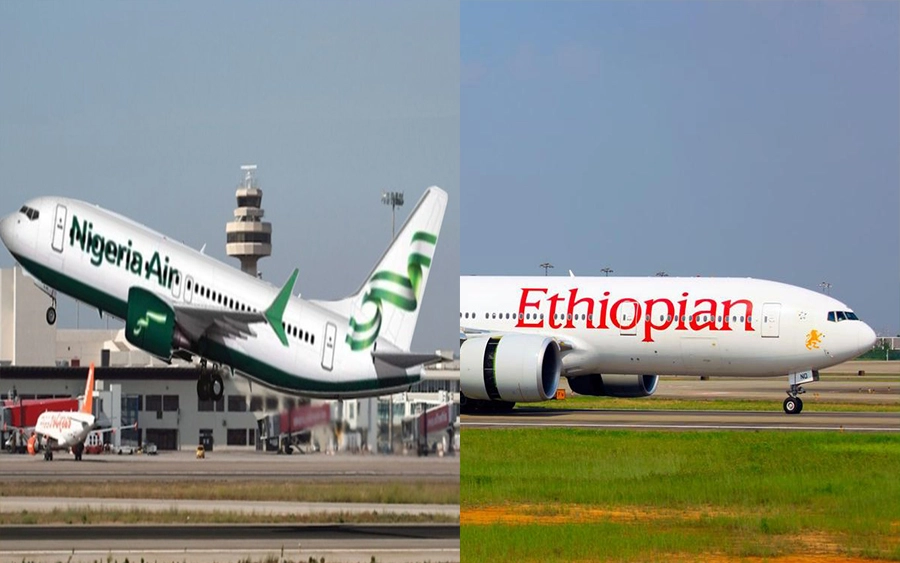Ethiopia’s Nigeria Air?
On September 23, 2022, Nigeria’s Aviation Minister, Hadi Sirika, announced a consortium led by Ethiopian Airlines (ET) as the preferred bidder for the new national carrier, Nigeria Air. Under the agreement, Ethiopian Airlines would own 49 per cent as “minority shareholder” while the Nigerian government will have five per cent stake. Three Nigerian investors, MRS […]

On September 23, 2022, Nigeria’s Aviation Minister, Hadi Sirika, announced a consortium led by Ethiopian Airlines (ET) as the preferred bidder for the new national carrier, Nigeria Air. Under the agreement, Ethiopian Airlines would own 49 per cent as “minority shareholder” while the Nigerian government will have five per cent stake. Three Nigerian investors, MRS Oil, cargo handler SAHCO and other Nigerian investors own 46 per cent. Nigeria Air is planned for launch in the fourth quarter this year with three B737-800s dry-leased from Ethiopian Airlines. It will start with shuttle service between Abuja and Lagos before the end of 2022, while other domestic destinations will follow. The consortium is also expected to invest USD300 million to grow the new national airline to 30 aircraft and an international operation within two years.
A statement from the Ministry of Aviation said bidding for Nigeria Air was under the Public-Private Partnership (PPP) regulations and overseen by the Infrastructure Concession Regulatory Commission (ICRC). Emphasizing that all due processes were followed, the statement said after the issuance of compliance certificate for the Full Business Case (FBC) by ICRC and approval of FBC by the Federal Executive Council (FEC), the deal would be sealed.
We can only look with hope for the confidence of Ethiopian Airlines to succeed where Richard Branson’s Virgin Nigeria failed. Following former President Olusegun Obasanjo’s liquidation of then moribund Nigeria Airways in 2003, Branson established the domestic and international carrier, Virgin Nigeria, but pulled out in frustration in 2010, stating that Nigeria has no regard for sanctity of contractual agreements. “If Virgin Nigeria can be treated in this way, can any company in the world seriously consider investing in Nigeria in the future?”, he had queried.
In winning the bid, Nigeria Air would not be the first in Ethiopian Airlines’ quest to be the dominant leader of the continent’s skies where it has already established presence in more than six African countries through various management or strategic partnerships. The Addis Ababa-based carrier is starting a new national carrier in Zambia, where it holds 49 per cent stake while Zambia has the remaining 51 per cent. The same percentage is also applicable in the airlines’ agreement with the Democratic Republic of Congo over management of its new national airline. It is also restarting operations of the Mozambique carrier. In addition to these, Ethiopian Airlines has strategic partnerships with ASKY in Togo, Malawian Airlines and Chad-based Tchadia Airlines, and with the Ceiba Intercontinental in Equatorial Guinea.
All of these are indication of the airlines’ expertise and dominance of Africa’s aviation landscape. According to the International Air Transport Association (IATA), Ethiopia’s aviation industry contributes 5.7 per cent to the country’s GDP, with a value of $4.15 billion while creating direct and indirect jobs of 1.1 million. For Nigeria, aviation contributes a paltry 0.4 per cent valued at $1.7 billion and a little over 241,000 jobs, a sad commentary in a nation of over 200 million people.
Daily Trust believes Nigeria deserves, and should have, a strong and sustainable aviation sector led by a national carrier, given our population and the size of our economy. But we are not convinced the present arrangement with Ethiopian Airlines will deliver that expectation for Nigeria. First, what are the terms and conditions of this new agreement? How public and open was the bidding process, and which other bidders participated? What, precisely, is Ethiopian Airlines bringing to the table for its 49% stake? How is 49% stake a “minority” shareholding, given that the Nigerian partners and the federal government will own less individually? And why has it taken nearly eight years and billions of naira in reported consultancy fees?
A national carrier is a vital asset whose significance goes beyond business considerations. Issues of national security, national pride and international image of the country also come to play, since national carriers are also avenues for projecting national economic power, confidence and culture. And if, as many said at the time, the arrangement with Branson was not a good idea, this is scarcely better.
Industry experts have repeatedly said the problems with our aviation sector are mainly inadequate capitalization, competent management, and of course, the old Nigerian disease of corruption and mismanagement. This is why local operators tend to collapse soon after coming on stream. Therefore, what the aviation industry needs is a complete overhaul led by the government itself, rather than cosmetic partnerships that only strengthen a direct regional competitor.
The present moment in Nigeria’s aviation sector calls for a consolidation project such as happened successfully in the banking sector in the past decade. It should be possible to consolidate all the existing local airlines into two, recapitalize them over the long-term, review the Bilateral Air Services Agreements (BASA) with other countries, and actively set and enforce sustainable regulations that would enable them not only to benefit from Nigeria’s huge domestic and international market potentials but also to compete effectively against regional giants like Ethiopian Airlines. Nigeria deserves a better deal than this.
